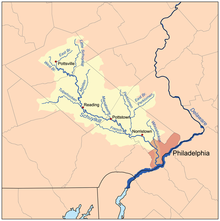
Tulpehocken Creek is a 39.5-mile-long (63.6 km)[1] tributary of the Schuylkill River in southeastern Pennsylvania in the United States, and during the American Canal Age, once provided nearly half the length of the Union Canal linking the port of Philadelphia, the largest American city and the other communities of Delaware Valley with the Susquehanna basin and the Pennsylvania Canal System connecting the Eastern seaboard to Lake Erie and the new settlements of the Northwest Territory via the Allegheny, Monongahela, and Ohio Rivers at Pittsburgh.
An important transportation route in the early United States, the creek drains a limestone hill country area of Berks County south of the Appalachian Mountains and is considered one of the finest trout streams in southeastern Pennsylvania. The valley of the creek was known in colonial times as the Tulpehocken, stretching west of Reading. It was inhabited by the Lenape and was a destination for early German-speaking settlers. The name comes from a Lenape word Tulpewikaki, meaning "land of turtles".[2] It is a designated Pennsylvania Scenic River. Major tributaries include the Cacoosing Creek, Spring Creek and Northkill Creek.
- ^ U.S. Geological Survey. National Hydrography Dataset high-resolution flowline data. The National Map Archived 2012-03-29 at the Wayback Machine, accessed April 1, 2011
- ^ "Early history". Reading Eagle. Jun 9, 1896. p. 25. Retrieved 18 October 2015.